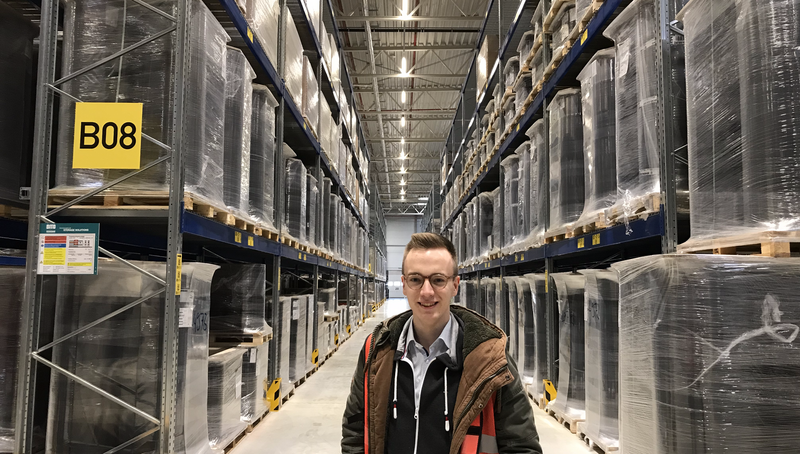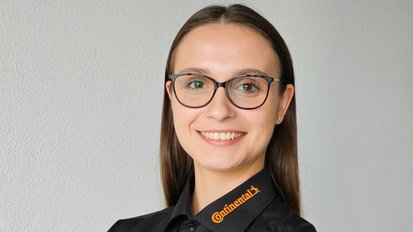Moving Things Forward as a Dual Student
Hi, my name is Leon. Currently, I am working in the Supply Chain Management of ContiTech. At this point, I bet with you that you’ve all crossed path with one of our products before. And no, this time it’s not about tires. But more on that later.
I came to Continental in September last year. Here, I am absolving an integrated degree in Business Informatics. Back when I was in school, I already was enthusiastic about IT & technology. On the other hand, I’ve never been someone who likes spending hours in dry theories and calculations. For me it has always been important to see a practical benefit in what I am working on. Added to that was my interest in economic contexts, which made the study subject Business Informatics predestined for me. Business Informatics is a very practice-oriented subject, which is why an integrated degree in this area is more than recommended. The practical and university phases alternate on a block-by-block basis, so in every semester, you study three months and spend the equal amount of time working in the company. There are various advantages of such a study program. The three-month block times allow you to focus yourself intensively either on studying or working in the company. In addition, the alternating theoretical and practical phases provide you some very varied 3 years, because you almost never have the same tasks, but later more on that. Last, I’d like to mention the apprenticeship salary, which is particularly useful for all students who have moved away from home for their studies and gives them the opportunity to stand on their own two feet.
As a Hanoverian suburban kid, Conti has been with me for a long time. Decisive for my application, however, were the great projects Continental is working on. Technologies for autonomous driving, to avoid accidents or even for environmentally friendly and emission-free mobility, just to name a few keywords. Conti has long been synonymous with much more than just tires. Given my passion for Continental I was incredibly glad when the commitment reached me via e-mail, after a several hours hiring test and a full-day assessment center. My time at Continental started in early September 2018 with a two-week introductory week. First impression at that time: Wow. So much input. How many divisions are there again? And what is a business unit? With time, however, things become much clearer. But one thing is certain: When you are a part of such a huge company, you will be more aware of its dimensions!
After a first three-month theory phase, which provided us with some basics in IT & Economics, we went into the first practical phase. I already had a first appointment with my current department during the university phase. Currently, I am employed in the Supply Chain Management for Global Methods and Standards at the Benecke-Hornschuch Surface Group.
Continental is divided into 5 divisions, depending on what kind of technology it is. In total, there are 27 so-called business units, each belonging to one of those divisions. Each business unit has specialized on a type of product, e.g. on car tires, vehicle sensors, instruments, and much more.
The Benecke-Hornschuch Surface Group is Conti’s surface specialist with almost 5,000 employees and eleven locations worldwide. From artificial leather for dashboards to covers for fitness equipment and tram seats to the floor material in aircraft cabins, everybody meets products from Benecke-Hornschuch in daily-life. Each material must meet very specific requirements. For example, automotive interior material may not be flammable, some surfaces may need extra strength, and some need to have pleasant feel when touching while providing a good durability. Supply chain management must ensure that customer supply is given at all times. To do this, the right amount of raw, semi-finished and finished materials must be made available in the right place at the right time. As the name implicates, the Methods & Standards team is responsible to ensure the best possible logistics processes.
Here, I am working on a project for the exact evaluation of logistics costs. At the end of the practical phase, a tool should make it possible to see exactly how high the costs for freight, packaging and storage are in the various plants worldwide. Later, the project should provide the input for the entire ContiTech division. The main challenges lie in the question of how exactly logistics costs are defined and how they can be collected. In addition, not all locations work with the same systems and therefore a solution must be found that all data ends up at the same location. For this, I need to work with colleagues from other departments, such as the controlling department, but also from other locations, for example from Spain, China or the United States.
My first tasks are already very exciting. Currently, I am working on IT, logistics, finance and project management topics. Already now, a lot of project responsibility has been transferred to me and I am treated as a full member of the team. The colleagues from the other departments are always available when you have questions or just want to have an insight into their tasks.
In the future, there will be five more practical phases for me, in which I can also work in other departments and Conti entities. One of the special highlights of the integrated degree program at Continental is the semester abroad, in which you will work three months in one of the more than 400 locations worldwide. Whatever comes up soon, it is clear, that the apprenticeship at Continental is extremely varied and offers great insights into an international technology company!
This article was written by our employee.

Leon Bittner





